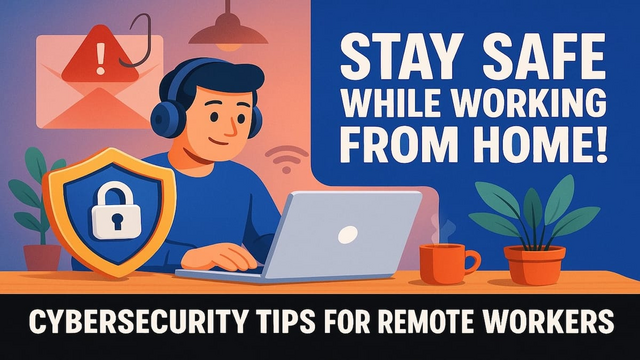Remote Work Cybersecurity: Stay Safe While Working From Home

Working from home is the new normal for millions of individuals globally. Although it provides numerous advantages such as flexibility and convenience, it also comes with some additional risks — particularly in the area of cybersecurity.
As an employee who works from home, you are now beyond the secured bubble of your company's corporate network. As a result, you now have the frontline defense against the security threats posed by hackers, viruses, and information breaches. Don't worry. The solution? With minimal training and a couple of simple practices, you and your business are protected.
In this blog, we'll demystify cybersecurity for remote workers in easy terms and provide actionable advice you can implement today.
Why Cybersecurity Is More Important Than Ever
Cybercriminals are always on the lookout for vulnerabilities to exploit. With more individuals working remotely, they see a huge chance. Home networks are typically less secure than office networks, and numerous remote workers utilize personal computers that might not have adequate defense.
If someone hacks into your system, they might:
- Steal confidential company information
- Get access to your personal data such as bank account details
- Block you from your files (ransomware)
- Use your system to hack others
This can have severe implications — not only for your business, but also for you yourself.
Typical Cybersecurity Risks for Remote Employees
Let's first explore the most prevalent cyber threats before we move on to solutions:
- Phishing Attacks: Phishing is when a computer hacker sends you an imitated email or message that appears legitimate. They attempt to fool you into opening a link, downloading an attachment, or revealing personal information. Example: An email that appears to be from your boss requesting you send your password or click on a suspicious link.
- Weak Passwords: Most individuals continue to employ simple passwords such as "123456" or "password." These are extremely simple for hackers to obtain with automated tools.
- Insecure Wi-Fi Networks: Home Wi-Fi networks might lack good passwords or encryption. Nearby hackers can capture data if your connection is not secure.
- Outdated Software: If your computer or phone is not up to date, it may have security vulnerabilities that hackers can use.
- Using Personal Devices for Work: Combining work and personal use is risky if your personal device lacks robust security measures.
Best Cybersecurity Advice for Remote Employees
Here's how you can remain safe working from home:
Utilize Strong, Uncommon Passwords
Utilize lengthy passwords that combine letters, numbers, and symbols.
Don't reuse the same password across various accounts.
You can use a password manager to create and store your passwords securely.
Activate Two-Factor Authentication (2FA)
2FA provides an additional layer of protection. Even if an intruder obtains your password, they cannot access your account without a second method of authentication (such as a code delivered to your phone).
Implement 2FA on all your work accounts, particularly on email, file storage, and communication apps.
Protect Your Home Wi-Fi
- Alter the default Wi-Fi password on your router.
- Utilize a solid, one-of-a-kind password for your network.
- Ensure your Wi-Fi is employing WPA3 or WPA2 encryption (consult your router settings).
- Don't allow strangers or visitors to share your network.
Update Your Devices
Always update to the latest versions for:
- Your operating system (Windows, macOS, etc.)
- Web browsers (Chrome, Firefox, etc.)
- Antivirus software
- Any work-related apps or tools you employ
Updates tend to repair security vulnerabilities that hackers can use.
Employ a Virtual Private Network (VPN)
A VPN secures your internet connection and makes it much more difficult for hackers to monitor your activity. Some organizations offer VPN access — if your organization does, be sure to take advantage of it.
Otherwise, you can use a personal VPN service when dealing with sensitive information.
Be careful with Phishing Emails
Here's how you can recognize a phishing attempt:
- Check for misspelled words or odd word choice.
- Verify the sender's email address — is it truly from your boss or IT department?
- Do not click on links or open files from unsolicited sources.
- If in doubt, call the person back in a different method (such as a phone call or stand-alone email).
Secure Your Devices
Lock your computer whenever you leave it, even at home. You can easily do this by:
- Windows: Windows + L
- Mac: Control + Command + Q
Also, make your device auto-lock after a brief period of inactivity.
Install Antivirus and Anti-Malware Software
A good security software can identify and prevent threats from causing harm. Keep it updated and perform regular scans.
Back Up Your Data Regularly
Back up important files using cloud storage or an external hard drive. This will safeguard your work in the event of ransomware or hardware failure.
Separate Work and Personal Use
- Do not use your company laptop for personal use.
- Avoid installing arbitrary apps or games on work machines.
- Don't use personal mail for corporate communication.
If your organization has secure collaboration software such as Slack, Teams, or Google Workspace, use those instead of personal platforms.
Bonus Tips for Additional Safety
- Employ encrypted communication tools for confidential chats.
- Don't over-share on social media — hackers can use personal information to hack your password or target your phishing.
- Use caution with USB drives — never insert unfamiliar USB drives; they could contain malware.
What Employers Can Do to Help
Cybersecurity is not only the employee's responsibility. Employers can assist remote workers by:
- Providing frequent cybersecurity training
- Offering secure hardware and VPN access
- Establishing clear remote work policies
- Monitoring for threats without intruding on employee privacy
A good security company culture keeps us all safe.
Final Thoughts
Cybersecurity may seem confusing, but it doesn't have to be. Just think about locking the doors to your cyber home. Some simple habits — such as strong passwords, updating software, and being careful with emails — can do a lot to keep yourself and your business safe.
As remote work continues to grow, staying safe online is not just an option — it’s a necessity. By taking these steps, you’ll be able to work from home with confidence and peace of mind.
Stay safe, stay smart — and keep your digital workspace secure!




